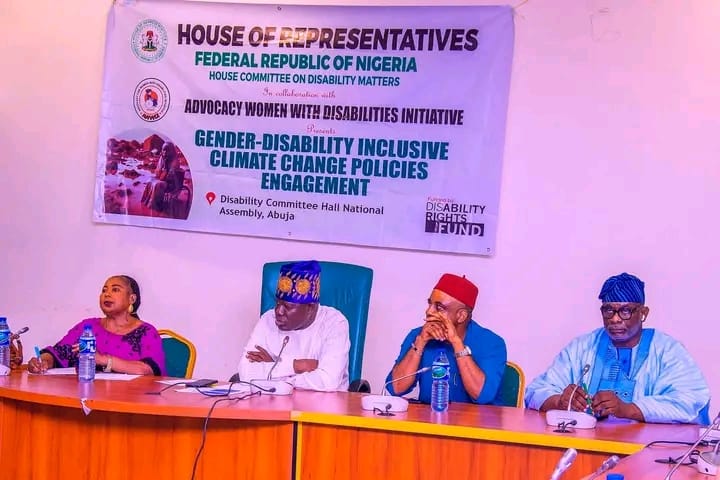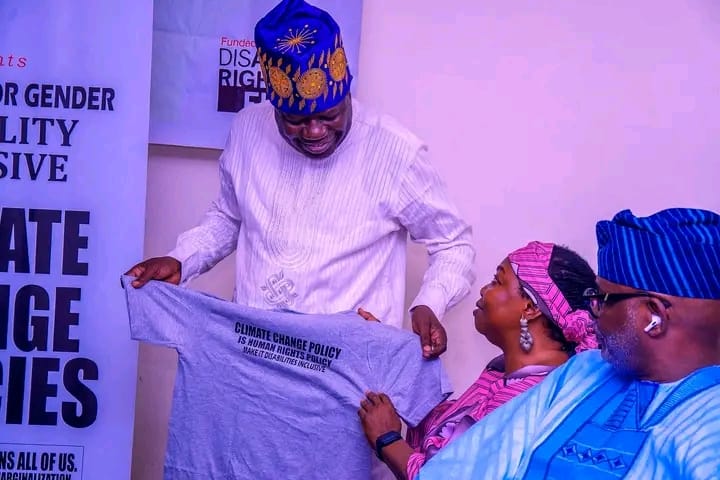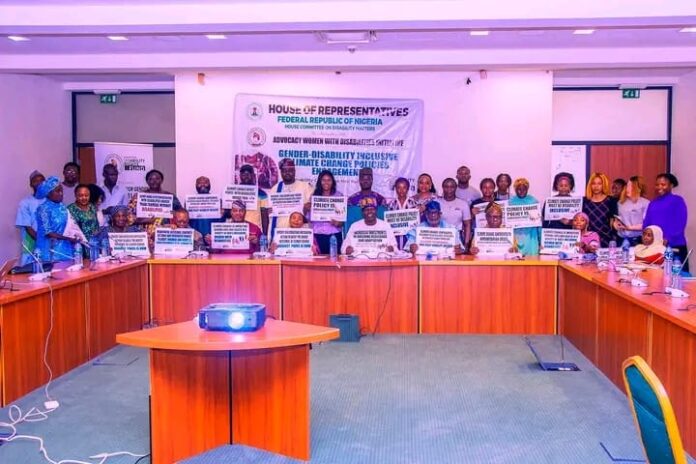Abuja, Nigeria – In a landmark event aimed at reshaping the landscape of climate change policy, the Advocacy Women with Disabilities Initiative (AWWDI) organized a pivotal meeting titled “Gender-Disability Inclusive Climate Change Policies Engagement” on June 11, 2024. Held at the Disability Committee Hall in the House of Representatives, National Assembly, Abuja, this event sought to address the critical intersection of gender, disability, and climate change, ensuring that people with disabilities (PWDs) are comprehensively included in all relevant legislative and policy frameworks.

The meeting was a significant convergence of key stakeholders, prominently featuring Honourable Dr. Dauda Bashiru, Chairman of the House Committee on Disability Matters, and Patience Ogolo Dickson, Executive Director of AWWDI. The gathering also included committee members, representatives from various Ministries, Departments, and Agencies (MDAs), the National Human Rights Commission’s disability desk officer, spouses of PWDs, and women and girls with disabilities. This diverse assembly underscored the broad-based support and collaborative spirit essential for advancing inclusive policies.
Advocating for Comprehensive Inclusion
The central theme of the event was advocating for the full inclusion of PWDs in climate change-related policies and programs. AWWDI highlighted the urgent need for policies that recognize and address the unique vulnerabilities and needs of PWDs, particularly in the context of climate change. The organization’s call to action emphasized the importance of collaborative efforts between government bodies and advocacy groups to ensure that PWDs are not marginalized in the policy-making process.

“Climate change affects everyone, but its impact on people with disabilities can be disproportionately severe,” said Patience Ogolo Dickson in her opening remarks. “It’s crucial that our policies are inclusive and considerate of the specific challenges faced by PWDs, especially women and girls.”
Legislative and Policy Frameworks
The event spotlighted the Disability Act as a fundamental framework for promoting accessibility, rights protection, and mental health support for PWDs. AWWDI urged MDAs to actively engage with the needs of PWDs and ensure compliance with the Act’s employment quota of 5%. This quota is a critical component in promoting economic empowerment and reducing the high unemployment rates among PWDs.
Honourable Dr. Dauda Bashiru echoed these sentiments, stressing the importance of legislative support in driving inclusive policies. “The Disability Act is not just a piece of legislation; it’s a commitment to equity and justice for all Nigerians,” he stated. “We must ensure its full implementation and work towards integrating PWDs into every aspect of our policy frameworks, especially in areas as impactful as climate change.”
Voices from Key Stakeholders
Representatives from the National Human Rights Commission and the Ministry of Environment underscored the necessity of including PWDs in all policy areas, particularly those related to climate change. They highlighted the interconnectedness of environmental policies and human rights, pointing out that excluding PWDs from these conversations could exacerbate existing inequalities.
Mr. Akorede Adebowale brought attention to the mental health challenges faced by PWDs, advocating for comprehensive support systems that include employment opportunities for their spouses. “Mental health is a crucial component of overall well-being,” he noted. “By providing economic opportunities and support for the families of PWDs, we can create a more inclusive and supportive environment.”
Commitment to Ongoing Advocacy
The event concluded with a strong reaffirmation of the participants’ commitment to advocating for the rights and inclusion of PWDs. The discussions underscored the importance of continuous advocacy, inclusive policies, and collaborative efforts to ensure that PWDs are adequately represented and supported in all areas of life.
In a closing statement, Patience Ogolo Dickson emphasized the need for sustained action. “This event is just the beginning,” she declared. “We must continue to push for policies that are not only inclusive but also actively address the barriers faced by PWDs. Together, we can build a society where everyone, regardless of ability, can thrive.”
The “Gender-Disability Inclusive Climate Change Policies Engagement” event marked a significant step towards ensuring that the voices of PWDs are heard and considered in climate change discussions. It highlighted the critical need for inclusive policies and the power of collective advocacy in driving meaningful change. As the participants left the Disability Committee Hall, there was a palpable sense of determination to keep moving forward, advocating for a more inclusive and equitable future for all Nigerians.


